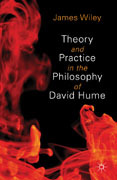
The author argues that the relationship between theory and practice was central to Hume, that he developed .two. theories of theory and practice (one in the .Treatise of Human Nature., which separates theory and practice, another in the .Enquiries., which links them), that the secular speculative philosophy ofhuman nature in the .Treatise. leads to the humanist practical philosophy of Hume's .Essays, Moral, Political and Literary. and .History of England., and that the foundations of Hume's political theory are history and political realism rather than custom and tradition. Although Hume is usually considered a skeptic and the originator of the 'is/ought' distinction, he genuinely believed that 'the life of virtue' is happiest and that this conclusion derived equally from philosophy and common sense. The author argues for the continuing relevance of Hume's views on human nature, common sense, practical philosophy, ethicsand humanism. INDICE: Acknowledgements.Hume and the Problem of Theory and Practice in Philosophy and Political Theory.Hume's Naturalism and Skepticism in the .Treatise. and His Appeal from Theory to Practice.The Systematic Theory of Theory of the .Treatise of Human Nature.The Behaviorist Theory of Practice of the .Treatise.The Practical Philosophies of Skepticism and Commercial Humanism.The CommonSense Theory of Theory of the .Enquiries, Essays. and .History of England.TheCommon Sense Theory of Practice of the Later Works.Hume, Theory and Practice Today.Notes.Bibliography.Index.
- ISBN: 978-1-1370-2641-5
- Editorial: Palgrave Macmillan
- Encuadernacion: Cartoné
- Páginas: 336
- Fecha Publicación: 24/08/2012
- Nº Volúmenes: 1
- Idioma: Desconocido
